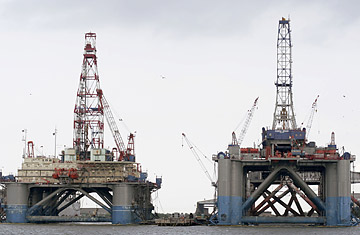
Two oil drilling platforms lie in the Port of Galveston undergoing repairs Sept. 6, 2005, in Galveston, Texas
For months now, the only silver lining for many amid the gathering economic gloom has been the pleasant sensation of filling their cars with ever cheaper gasoline. But that relief at the gas pump has slashed the revenues of the oil-producing countries, and on Wednesday they pushed back when the 11 oil ministers of the Opec cartel agreed to cut their combined output by about 2.2 million barrels a day starting January 1. The biggest production cut in Opec's 48-year history is an emergency measure aimed at reversing the precipitous slide in world oil prices, which the cartel hopes to push up to almost double their current level.
The latest cut follows an October cut of 1.5 million barrels a day, which failed to arrest the downward slide in oil futures — prices have plunged a further 18% since November, deepening fears among oil-rich nations of an economic disaster at home. Whereas in July, with futures at a record high of $147 a barrel, the daily oil earnings for Opec's 11 members stood at $4 billion, this week, with oil hovering at around $43 a barrel, the cartel's combined daily earnings stood closer to $1.2 billion. Saudi Arabia's oil minister Ali Al-Naimi said last month that Opec members needed a price range of between $60 and $80 a barrel in order to sustain their exploration and costly production. To achieve that, he recommended that the cartel, which pumps 42% of the world's oil output, makes "a significant cut" in production — and urged non-Opec producers such as Russia and Azerbaijan (whose oil ministers also attended the summit) to do the same, "for the purpose of bringing stability to the market." (See pictures of the remains of Detroit.)
But slashing production is unlikely to achieve stability or even to significantly boost prices, say analysts, because traders and investors had anticipated Opec's move and have, for weeks, priced it into their transactions. Investors have pulled billions of dollars out of the oil-futures market since the onset of the financial crisis three months ago, and, say analysts, Opec's ability to control the fluctuation of prices has diminished in recent years as the factors governing supply and demand have grown vastly more complex.
World oil prices began surging late last year partly because of the soaring demand from China and India's fast-growing economies, leading many to speculate that the world could actually run short of oil. But just as some long-planned new oil projects in Saudi Arabia and elsewhere came on line, those emerging economies began to slow, and the United States — the world's biggest energy consumer — faced its biggest economic crisis in decades. One result has been that Americans are driving less — 100 billion miles fewer in the first 10 months of this year than in the same period for 2007, according to the U.S. Department of Transportation. Far from a shortage, there's now a surplus of oil, with about 50 million barrels of it currently stored in about 25 oil tankers awaiting buyers.
"Until mid-2008, you were butting up against lagging supply growth," says Greg Priddy, global oil analyst at the Eurasia Group in Washington. "But this drop is driven by collapse in demand. Nothing is going to globally control that." The scale of the oil market, with multiple new producing countries and burgeoning new consumer markets around the world, puts it beyond the control of Opec. "The market will just be more volatile," says Priddy.
The volatility of the past year is a product not simply of supply and demand factors, but are caused by the ways in which oil is traded, say some experts, who recommend the introduction of mechanisms designed to prevent speculators from plunging into markets and withdrawing billions of dollars just as suddenly. "The prices are being largely made in the paper markets," says Paul Stevens, energy analyst at the London think tank Chatham House. "People are moving in and out of the market on a daily basis." The market is especially open to speculation since oil is traded in futures on the New York Mercantile Exchange, where traders are betting on what oil will be worth in a month or two, rather than on its actual value today.
Some are even proposing that the key to stability lies in cooperation between producing and consuming nations through the creation of a global fund that would be used to keep prices within an agreed target range. "I don't think Opec should continue to determine — or apparently not determine — what everyone pays for their oil," says Nick Butler, chairman of Energy Studies at Cambridge University's Judge Business School. A key objective, adds Robert Mabro, president of Oxford University's Institute for Energy Studies, would be to negate the impact of financial speculators on oil markets. "There is no logic in the world for oil to go from $50 to $147 in six months, and back to $43," he says.
But while such ideas may be gaining currency in the academic world, it could be years before oil producers, whose domestic economic arrangements depend on high prices, are prepared to cooperate with gas-guzzling consumers. "It's an idea which works in abstract, " says Priddy, but in reality, such cooperation is "absolutely impossible". So enjoy the pump price while you can, because oil markets are likely to remain unpredictable for the foreseeable future.
